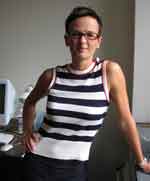

![]()
::: postdoc fellowships
::: senior fellowships
::: resident fellowships
::: associateships
![]()
being here
::: visiting
::: the last donut
::: photo album
::: center home >> people >> visiting fellows, 2006-07 >> ruphy |
||||
| Stéphanie Ruphy When she is not busy making the most of Parisian life, Stéphanie tries to think about several issues in general philosophy of science, revolving around the unity/disunity of science debate: reductionism, taxonomic pluralism, feminist critics of the value neutrality of science, and the epistemology of computer models and simulations. Reflecting a long interest in both science and philosophy, her qualifications include a BA in history of philosophy and a degree in aeronautical engineering (which came with a private pilot license), a Master in epistemology and a Master in astronomy and space sciences and, finally, a PhD in astrophysics from Paris Observatory and a PhD in philosophy of science from Columbia University, under the supervision of Philip Kitcher. After a couple of hectic years as a scientific journalist in Paris, Stephanie has eventually settled down for the quieter joys of the academic life in a philosophy department in the South of France: she’s currently assistant professor at the University of Provence, leaving the turbulence of the capital for a few days a week to teach philosophy of science to both students in philosophy and students in science (very much two worlds apart in France, unfortunately). 2015 Stéphanie Ruphy is currently Professor of Philosophy of Science at Grenoble Alpes University in France, where she is also head of the research team PPL (Philosophie, pratiques et langages). This past year, she gave two keynote talks, one in Tilburg at the 8th Munich-Sydney-Tilburg Conference in Philosophy of Science on Objectivity in Science and one in Ghent at the international workshop “Feminist Philosophy of Science“. Recent publications include “SMT or TOFT? How two main theories of carcinogenesis are made (artificially) incompatible” (with B. Bedessem), Acta Biotheorica, forthcoming 2015 and the invited review paper “Computer simulations: a new mode of scientific inquiry?”, in The Role of Technology in Science – Philosophical Perspectives, S.O. Hansson (Ed.), Springer, 2015, 131-146. She co-edited Recent Developments in the Philosophy of Science: EPSA2013 Helsinki, Springer, 2015. She coordinates the 2015-2018 project DEMOCRASCI (Epistemological foundations and principles for the democratization of science) with partners in Durham University, Hannover University and University of Montreal.
|
||||
